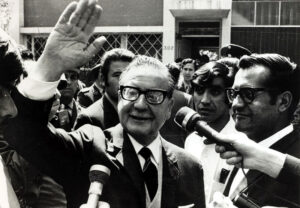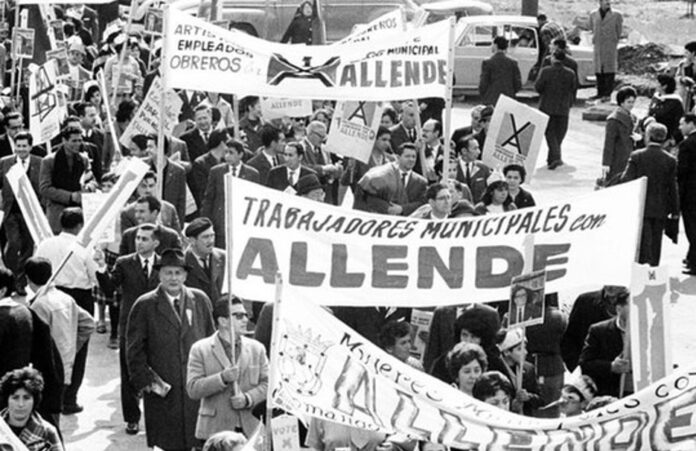“We (Chile) are moving towards socialism, not from an academic love for a doctrinaire system, but encouraged by the strength of our people, who know that it is an inescapable demand if we are to overcome backwardness and who feel that a socialist regime is the only way available to modern nations who want to build rationally in freedom, independence, and dignity.
We are moving towards socialism because the people, through their vote, have freely rejected capitalism as a system which has resulted in a crudely unequal society, a society deformed by social injustice and degraded by the deterioration of the very foundations of human solidarity.” – Salvador Allende
On 11 September 1970, General Augusto Pinochet led a military coup leading to nearly a decade of military rule in Chile. This date marks the beginning of the global neo-liberal era, where governments across the world began to move to establish strong authoritarian governments adopting market-led policies against the interests of the people.

On that day, Salvador Guillermo Allende Gossens, then President of Chile, died. His death was caused by suicide, a gunshot to the head. This was followed by a month of largescale murder and imprisonments of supporters of Allende and other leftists. The new military government held power for nearly a decade, destroying movements that evolved over decades before. On leaving power, Pinochet established a constitution that would enforce the neo-liberal governing structure he built for decades to come.
Allende’s government was the first in the world to chart a path to socialism using parliamentary means. In the few years it held power, despite horrible economic challenges, it remained popular. The military coup that followed became a symbol to all countries of how they would be punished if they decided to consider socialism in the future.
Rise of Anti-Capitalism in Chile
In 1929, a global financial crisis, known as the Great Depression, sent shockwaves through Latin American. The depression led to a near-collapse of the mining sector in Chile, which affected all parts of the economy. At the same time, a growing consciousness in the workers let to anti-capitalist movements taking off, including Marxist, Leninists, anarchists, Mapuche (indigenous), and feminist movements. While the economy suffered, this was also a time where Chile began to stabilize its civilian government, which up until then had been teetering on military rule.
In 1933, Salvador Guillermo Allende Gossens, a physician who had been influenced by leftist thought, co-founded the Socialist Party of Chile. The movements of the time led to the nationalisation of major industries and the establishment of critical labour reforms.
Starting from the 1950s, Chile saw a right-wing swing in its politics. The extreme right-wing fell out of the political landscape after World War II, but conservative Christian factions began to gain strength. The American government played a role in this swing, financially supporting the right-wing parties and promoting propaganda campaigns in Chile. American involvement intensified after the Cuban revolution in 1959.
In this period, Allende grew as a Presidential Candidate for the Left-Wing Coalition. Though he barely received 5% of the popular vote in his first bid, subsequent bids made impressive gains, getting nearly 30% of the popular vote in subsequent elections. He finally won in 1970 with support from the Christian Democratic Party giving his coalition enough to win.
Allende kept close ties with the Communist Party of Chile. The CPC’s presidential candidate, famed poet Pablo Neruda, supported Allende’s bid and served as a diplomat under Allende’s government.
“The nationalisation of our copper is not an act of vengeance or hatred directed towards any group, government or nation. We are, on the contrary, positively exercising an inalienable right on behalf of a sovereign people – that of the full enjoyment of our national resources exploited by our national labour and effort.”– Allende
Allende’s rise was seen as a threat to America’s hegemony in Latin America. Though technically not part of the Communist Party of Chile, Allende’s was the first socialist government that could take power in the American continents through parliamentary means. Even more threatening, Allende advocated policies that went against American business interests.
A threat to American Business Interests
When he first took office, Allende gave a famous speech, now called, “The Chilean Path to Socialism” speech. In his speech, Allende described how Chile could use parliamentary methods to move towards a Marxist humanism, and build on pro-people policies. One of the proposals in the speech was the nationalisation of the copper mines, which were used by American businesses until then.
The result was an economic backlash from America. The United States also engaged in a series of economic tactics to increase inflation in Chile, reducing the average wages despite raising the minimum wage when Allende was in power. This was in line with American policies regarding Latin America.
From 1966 to 1973, Argentina, Bolivia, Brazil, Peru, and Uruguay had military coups. This was accomplished by American propaganda. Latin American military leaders would attend the US Army School of the Americas, where they were tutored in anti-communist/pro-American propaganda and “national security” techniques. Graduates of the school maintained good relations with the US, even after the military took over.
Regarding Chile, American President, Richard Nixon, was reported saying that he wanted to “make the economy scream.” America stopped trade with Chile. This hurt the transport and machinery sectors in Chile. As a result, Chile’s transport and mining sector suffered deeply. Vehicles and machines could not be repaired because of a lack of spare parts or tires.
The stagnation of the economy led to a dramatic fall in real wages. By the time of Allende’s death, real wages fell to nearly a third of what it was when he took power.
From 1972, social unrest began to rise, mostly from the Chilean middle-class. Despite the social unrest and a struggling economy, in the 1973 Senate elections, Allende’s allies got more votes and more seats.
US-Backed Military Coup
After the 1973 election, the Chilean military, along with various right-wing paramilitary groups began to organize the overthrow of the Allende government. Every violent act by the paramilitary groups led to calls by the opposition parties for greater powers for the military. In August 1973, the opposition party demanded that the Chilean military protect the law and order of the land.

The military chose the date to match the takeover by the military on 12 September 1924. To them, the movements which began in the 1930s were symbolic of a loss of authority and prestige.
The aftermath of the takeover was brutal. Most notably, to break any resistance, the military converted the Estadio Nacional (National Stadium) in Santiago, Chile’s capital, to a prison camp where thousands were detained, tortured, and executed for supporting Allende.
While Chile has since transitioned back to a democracy, Pinochet established a very regressive constitution, which plagues movements in Chile to this day.
From 2006 onwards, when students began taking to the street, Chile finally saw the rebirth of resistance against the neo-liberal policies of Pinochet.
2019 saw the largest protests seen in the country since the coming of Pinochet. These protests shook the world, but owing to the COVID-19 pandemic, the state instituted lockdowns in several key areas. Resentment continues, but owing to the lockdown, the state has established control over key areas of protest.
11 September stays in the memory of the Chilean people as the day their parliamentary path to socialism was brutally taken from them.




[…] Related: The first 9/11: How the Parliamentary Path to Socialism in Chile was Crushed […]